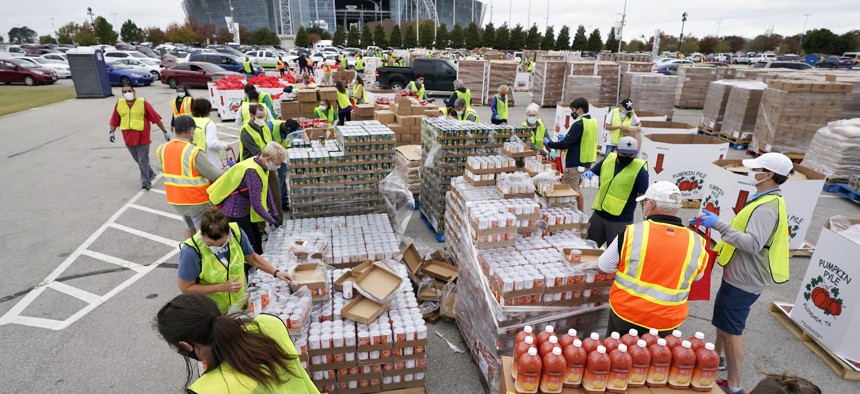Food Banks See Higher Demand Than Usual Before Thanksgiving

Volunteers build bags of dry goods in a parking lot outside of AT&T Stadium during a Tarrant Area Food Bank mobile pantry distribution event in Arlington, Texas, Friday, Nov. 20, 2020. AP Photo/Tony Gutierrez
Officials fear food insecurity will worsen even more if federal programs adopted during the pandemic are allowed to expire.
Food pantries are used to long lines for meal giveaways ahead of the Thanksgiving holiday.
But as many Americans continue to cope with the effects of the economic crisis brought on by the coronavirus pandemic, local food banks say the need has been even greater this year.
The North Texas Food Bank has distributed 60% more food during the pandemic than last year, doling out as much as 3 million pounds of food some weeks, said Valerie Hawthorne, the organization’s government relations director.
“People are seeking food assistance for the first time,” she said.
The food bank works with a network of 200 pantries to provide food they then distribute across 13 counties. But during the pandemic, it started hosting two direct food giveaways a day to supplement the distribution network. One large-scale event held over the weekend provided enough food to feed 6,200 households.
“That’s the biggest one we’ve ever done,” Hawthorne said.
With the jobless rate at 6.9% and more than 21 million Americans still receiving unemployment benefits through state and federal programs, food insecurity is a major concern across the country this year. Nearly 81 million adults reported it was somewhat or very difficult to cover usual household expenses including food, rent, car payments or medical expenses, according to a recent Census Bureau survey. And nearly 26 million adults reported that their household did not get enough to eat in the last week.
While enrollment in the Supplemental Nutrition Assistance Program, typically known as food stamps, has increased during the pandemic, experts say the support that local governments and organizations can provide at the community level is critical in addressing food insecurity during the pandemic.
Many people who are facing financial difficulties may not qualify for unemployment or food stamps—such as workers who are still employed but have had their hours cut. That’s why it is important for cities to have broad outreach programs to ensure that residents who have not sought food assistance in the past know where they can get it, said Elaine Waxman, a senior fellow at the Urban Institute, on a recent call with reporters.
Local organizations say they have adjusted outreach and operations to meet that need.
The North Texas Food Bank didn’t put a lot of effort into advertising its food giveaways before the pandemic, but the organization now uses social media to spread the word about its pop-up events in the community, Hawthorne said.
The North Capitol Collaborative, an organization that operates a food pantry in Washington, D.C., began offering food delivery service to seniors, the disabled and pregnant mothers, said Aleesha Cade, the organization’s human resources and finance director.
The organization operates a food bank every two weeks but began offering the delivery service after seniors expressed concern about leaving the house during the pandemic. It now delivers food to about 100 families each month.
The organization distributed food to about 350 families on Monday at its 18th annual Thanksgiving food basket giveaway. Typically, families can choose between a ham or turkey basket with Thanksgiving sides included, but this year attendees were hard pressed to choose between the two, Cade said.
“People wanted everything they could get because the need is so great,” she said.
Food pantries were already struggling to keep up with elevated demand at the start of the pandemic. But with some pandemic assistance programs set to expire at the end of this year and no deal to renew federal aid in sight, many fear that the number of households experiencing food insecurity will only grow.
When the federal government stopped providing the $600-a-week enhanced unemployment benefits this summer, the number of people visiting food banks for assistance grew dramatically, Hawthorne said.
“It was very obvious. You saw the need on the ground,” she said.
Andrea Noble is a staff corespondent with Route Fifty.
NEXT STORY: Here Comes the Covid-19 Baby Bust





